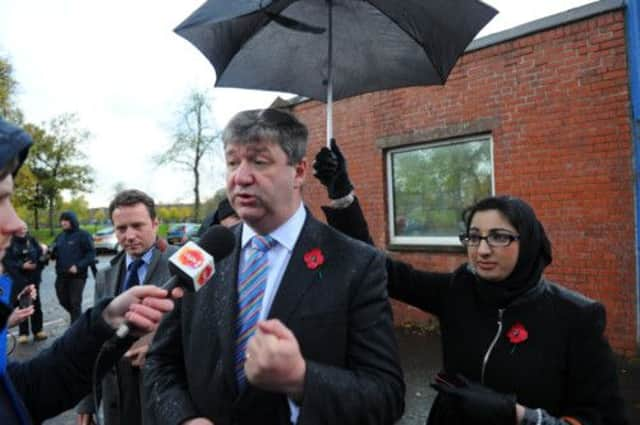Scottish independence: Sterling expulsion warning


Mr Carmichael said the Scottish Government should not assume it will be allowed to use the currency if Scots vote to leave the UK next year. He said that a deal “is not going to happen”.
The warning comes days before the Scottish Government unveils its blueprint for independence in a white paper which is expected to advocate Scotland keeping the pound in the event of a Yes vote.
Advertisement
Hide AdAdvertisement
Hide AdFirst Minister Alex Salmond has consistently maintained that “we will retain the pound” after independence.
The Scottish Government said last night the pound “is as much Scotland’s as it is the rest of the UK’s” and that it had put forward “sensible proposals”.
Yesterday, Better Together leader Alistair Darling and Deputy First Minister Nicola Sturgeon locked horns over the status of the white paper following a Yes vote.
The Scottish Government believes a win in the referendum would act as an endorsement of its proposals as a package, as set out in the white paper.
But Mr Darling said the Nationalists could not assume that a Yes vote would mean their position on currency, as well as other disputed areas such as pensions and defence, would be simply accepted by the UK government just because that was how it was laid out in the white paper.
The currency issue has been a central aspect of the independence debate for months. On Wednesday, the Welsh First Minister, Labour politician Carwyn Jones, said he was “not convinced” a currency union would work and warned his government could block the move.
But yesterday marks the first time a Westminster Cabinet minister has explicitly said a deal would not happen.
“George Osborne has said … it is highly unlikely,” Mr Carmichael said. “Most people in Whitehall understand that if George Osborne says something is highly unlikely, it is not going to happen.” And asked if he shared that view, he answered: “Yes.”
Advertisement
Hide AdAdvertisement
Hide AdThe Edinburgh Agreement saw both the Scottish and UK administrations agree to accept the result of the vote. The agreement, concluded in October 2012, included a line saying the vote would “deliver a fair test and a decisive expression of the views of people in Scotland and a result that everyone will respect”.
Speaking in Edinburgh yesterday, Ms Sturgeon said all the proposals in the white paper would be “reasonable and sensible and rational, and in the interest of the UK and in the interests of Scotland”.
She said: “If, following a Yes vote, we are negotiating in the spirit of the Edinburgh Agreement, then these things will be matters that are sensibly negotiated because the provision in the Edinburgh Agreement about both sides respecting the result (of the referendum) and working constructively in the best interests of the people of Scotland and the rest of the UK is something we both signed up to.”
If there is a Yes vote the “dynamic changes completely” between the Scottish and UK governments, she said.
In that situation, “the people have spoken, the democratic decision has been taken and we then sit down and negotiate
sensibly”.
Ms Sturgeon said if Scotland votes to leave the UK, the people would have endorsed the white paper, “that prospectus, as the starting point of an independent Scotland”.
She said: “We would expect, in the spirit of the Edinburgh Agreement, for these sensible and reasonable positions that will have been endorsed in a referendum to be negotiated with the UK government.”
She went on to say that a currency union would still give an independent Scotland control over taxes and that it is the best option for both Scotland and the rest of the UK.
Advertisement
Hide AdAdvertisement
Hide AdBut Mr Darling insisted the agreement did not commit the UK government to accepting a currency union, even if it is part of the plan put forward by the Scottish Government to the electorate. He said: “We’ve all signed up to abiding by the outcome of the referendum. But whatever happens after that, there would have to be a negotiation.
“There then has to be a detailed negotiation and discussion about 101 different things. And that’s why there’s so much uncertainty here about currency, pensions, regulation, debt, or building warships on the Clyde. All these things are up for grabs.”
SEE ALSO: